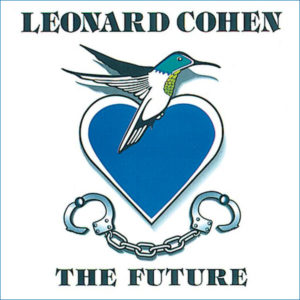wcag heading
“ . . . finally, I’d like to thank Leonard Cohen. The book is named after an excerpt from his poem/song — ‘Anthem.’” (Louise Penny, Acknowledgements, How the Light Gets In)
 Louise goes on to tell us that she first used the words in her second book.
Louise goes on to tell us that she first used the words in her second book.
“Gamache leaned in and put on his reading glasses.
Ring the bells that still can ring,
Forget the perfect offering,
There’s a crack in everything,
That’s how the light gets in.
He read it out loud. Beautiful.” (A Fatal Grace, Page 174)
Cohen, a Canadian and Quebecker like Louise, passed away last November and was hailed by Nick Cave as “the greatest songwriter of them all.” Anthem appeared on his 1992 album, The Future, but the song was a long time coming. It took Cohen 10 years to write and he reflected late in life on how much the song meant to him, “There’s not a line in it that I couldn’t defend.”
How the Light Gets In, the ninth Chief Inspector Gamache novel, is a harrowing tale of deep-seated corruption both political and moral. And, at its heart, the sanctity of Three Pines itself.
On page 117 of the novel, Gamache ponders, “Three Pines, he knew, was not immune to dreadful loss. To sorrow and pain. What Three Pines had wasn’t immunity but a rare ability to heal. And that’s what they offered him.”
 That statement, to me, epitomizes Louise’s choice for the title and its connection to Leonard Cohen’s profound words. As Cohen said himself in a rare interview in the early 90’s, “And worse, there is a crack in everything that you can put together: Physical objects, mental objects, constructions of any kind. But that’s where the light gets in, and that’s where the resurrection is and that’s where the return, that’s where the repentance is. It is with the confrontation, with the brokenness of things.”
That statement, to me, epitomizes Louise’s choice for the title and its connection to Leonard Cohen’s profound words. As Cohen said himself in a rare interview in the early 90’s, “And worse, there is a crack in everything that you can put together: Physical objects, mental objects, constructions of any kind. But that’s where the light gets in, and that’s where the resurrection is and that’s where the return, that’s where the repentance is. It is with the confrontation, with the brokenness of things.”
Three Pines certainly has some cracks but as Gamache points out it also has “a rare ability to heal” the brokenness of things.
When Louise originally reached out to Cohen to obtain the rights — and ask what it would cost — to license the stanza for inclusion in A Fatal Grace, she was astounded by his response:
He would give it to me for free. Free. I’d paid handsomely for other poetry excerpts, and rightly so. I’d expected to pay for this, especially given that at the time, six years ago, Mr. Cohen had just had most of his savings stolen by a trusted member of his team. Instead of asking for thousands — he asked for nothing. I cannot begin to imagine the light that floods into that man.
R.I.P. Leonard Cohen


